I need to explain a few things at the head of this article to avoid any confusion.
- Almost all of these issues can be solved by a Session 0. You set the expectation of what you want in your game and what the Players want in theirs. You come to a compromise where everyone is getting what they want (or as close to it as possible and move forward.) The Only way these Players exist in your group is if you didn’t set those expectations, they joined the game after Session 0, or they choose to ignore it and do what they want.
- I use certain terms that many of us will be familiar with (ie. Min-Maxer, Power Gamer, etc.). That does not necessarily mean that our definitions align perfectly. I will try to explain, throughout this piece, what I mean in reference to the whichever term is used.
- My way is not the only way. And the style in which you handle a situation can change from person to person. My views come from 30+ years of playing (at home, online, at cons, and at the FLGS) and having to handle these situations many times over the years.
- I don’t believe that anyone of these types are actually Problem Players, as long as they play by the understood parameters of the game set down by the group. They only become problems, when they try to force their style of play onto the rest of the group.
With those disclaimers out of the way, let’s get on with it shall we?
I want to start with the one I see the most division over. There are countless debates online over them and most people either love or hate them. You know who I’m talking about…
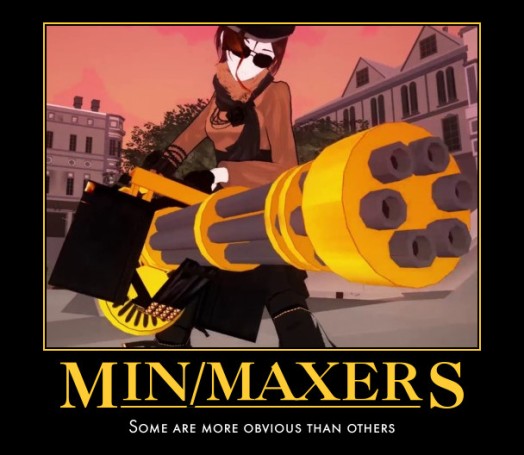
1. The Power Gamer/Min-Maxer: This is the guy who memorizes every minute rule on every page of the rule book, in order to build the most bad-ass character anywhere. On the surface there is nothing wrong with this. To be honest, I have never been one who believed that someone should be penalized for their mastery of the rules. However, it also depends on how this is handled by the players themselves. That’s why, in my group of friends at least, we have separated them into two distinct classifications: The Power Gamer and the Min Maxer. Whats the difference and how do you handle them?
- Min-Maxer: I read what is, in my opinion, the perfect definition for this type of player on a social media site not to long ago: “Min-maxing is deliberate abuse of system mastery and best practices to make the most overpowered character possible at the cost of character development, flavor or setting.” This Player knows every rule in the book. And he will bend them until they scream. He will make a build strictly for the ability to break the GM’s game and outshine the other Players. They also give absolutely no thought to whether or not the build choices make any sense in story. Just as long as they can do 50+ points of damage at level one. Please understand me. This can be a really fun type of play, if everyone is in on it. If they’re just coming to the table to throw things into disarray and make everyone else look inept for their character choices, that’s when they become a problem player. How do you handle these Players? Explain to the player that their style doesn’t match very well to the type of game you are running. Ask if they would mind playing more to the style at the table. If they say yes, cool. Give them another shot. If they continue, or if they refuse to change when you talk to them, politely let them know that their style simply isn’t meshing with the group and they should find another group who plays that style. (Addendum: One thing I ask that you keep in mind with players like this. Most were taught that this is what RPGs are all about by a GM that placed themselves in direct opposition and thus created a “GM vs. Players” atmosphere. give them the chance to try your style before giving them the heave ho)
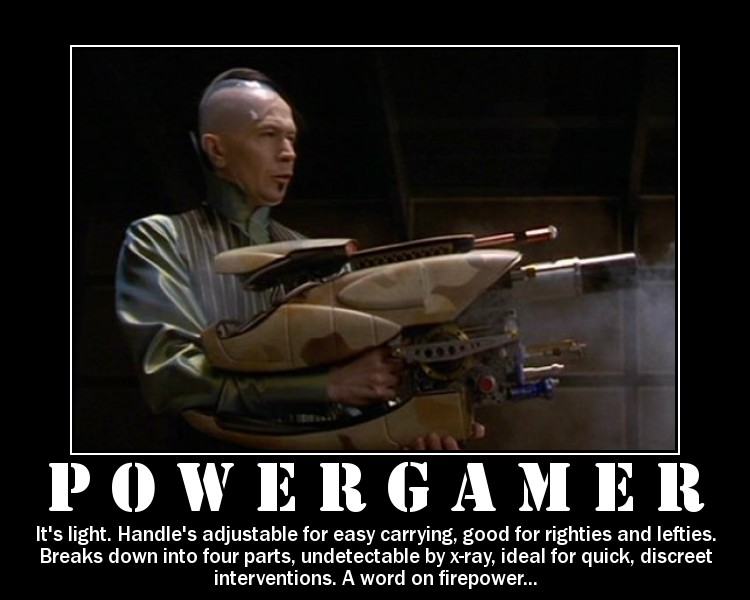
- Power Gamer: These Players are similar to the Min Maxers in many ways. They too scroll through every paragraph, of every page, of every rule book, in search of any advantage they might be able to seek out. The main differences, by our definition, is that a Power Gamer’s build choices still make sense thematically and they aren’t trying to break the game, they are simply trying to excel at it. They will outshine every other player at the table. Not out of malicious intent, as so many would have you believe, but simply because they don’t understand why you would play a character and NOT know every tactical advantage. I have had a ton of Power Gamers in my groups over the years and I loved having each and every one. A power Gamer is a Subject Matter Expert and they don’t mind sharing that knowledge. They want the game to succeed. They want the other players to be, at the very least, comparable in skill as they are. Why? Because that means that they can do what they always wanted to do: Elevate the level of the game. So, how do you handle these Players? Explain the you have no issues with their style of play, but that for you to challenge them, the rest of the party would surely die. If they want to play at that advanced of a level, you will need their help in (gently) bringing the rest of the party up to par. This play to their ego (while true) will also break down any defensiveness the player might feel initially and get you both on the same page.
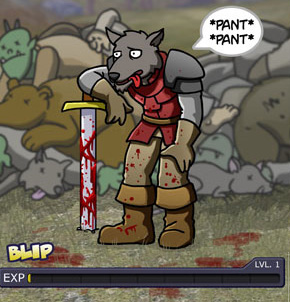
2. The Grinder: I am forced to admit that, when it comes to video games, this is my exact style of gaming. I will attack everything, search through every hallway, open every chest, take every side quest. And it works for me. Yes, it takes me longer to get through a game than others. But I also don’t have to do the Boss Fights 30 times each before I win.
That being said, if you are a Level Grinder in a tabletop RPG, you can slow the game down to a crawl. In a collaborative storytelling game you simply don’t need to kill everyone in sight.
Also, unless your GM has a strange way of handling out treasure, there isn’t going to be 10 gold hidden in every rat’s nest or hidden in a random piece of pottery (I’m looking at you “Legend of Zelda”). Stop searching for treasure in EVERY crook and cranny! Oh, and on a side note, killing and looting a random peasant for XP? Really?
How to handle these Players? Easy. Quit rewarding that behavior. No XP for murder of 0 level NPCs unless it is directly tied to the story.
Plus, if you’re a GM giving out XP for such behavior, you’re part of the problem.
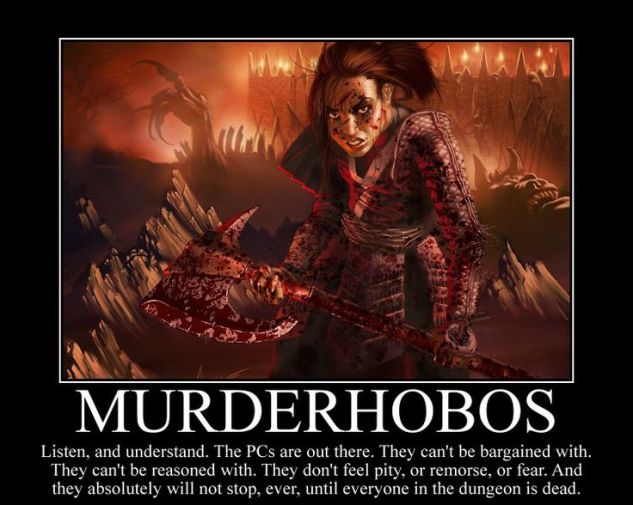
3.The Murder Hobo: Closely related to the Grinder, but they aren’t in it for the XP. they just wanna kill some things. After all, it’s much easier to deal with someone with them looking down the point of your sword, right?
I find that, for the most part, these are inexperienced role players. These folks aren’t really into killing as much as it may seem (though, obviously there will be exceptions to that rule) They simply get overwhelmed when it comes to roleplay. They don’t want to look stupid in front of the rest of the group. (and really, who does?) So when they don’t know what to say next, or they get a bit too nervous?
THEY KILL EVERYTHING IN SIGHT…
So how do you handle these Players?: Well, you could talk to them and see if you might be able to ease their nerves. Explain to them that yes, they are going to look goofy sometimes. Yes, people are going to laugh. They shouldn’t be bothered and should try to roleplay things out a bit more, as they might be missing clues or rewards by settling everything with violence.
Then, in game, you show them the consequences of their actions. When you kill people, I don’t care how you don’t like them, someone is probably going to want revenge. They will come after you. Whether it be the Law, Friends and Family, or Bounty Hunters.
Now once, I had a Murder Hobo player say, “Let them come, I’ll kill them too”. But that isn’t really how things like that work. Yes, you may kill the first one, maybe even the second, but then they’re going to raise the bounty and send MORE. Three at a time not enough? What about eight? What about platoon?
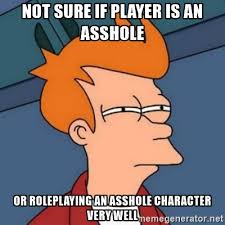
4. The “I’m just ROLEPLAYING” Troll: At the beginning of this article, I said that I didn’t believe that any of these players were problems, given the right gaming group. But, as I’ve also said many times, there are exceptions to every rule. They love to roleplay their character as the “star” of the game. To the point that they often build a character in such a way that will put them in conflict with almost every other player at the table.
Don’t get me wrong, everyone enjoys a little inter-party conflict. After all, conflict is what makes the story proceed forward. But this player has decided that the best way for them to become the center of attention is by screwing with, and over, the other members of the party. (stealing the party member’s stuff. killing them in their sleep, ratting them out to the authorities when they’re on the run, placing curses on them, telling the enemy where they are hiding, or abandoning them in the middle of the battle).
The world is their stage and everyone else is simply a supporting character. They don’t care if anyone else is enjoying the game, as long as they are. And yes, they are quite often the GM’s best friend, girlfriend, or relative. So therefore, they believe themselves to be untouchable.
How to handle these Players: Ask them to stop. Explain the parameters that you set down in Session 0. If they still insist on being toxic, remove them from the group.That can be touchy if they are close to you. But if you keep letting them ruin everyone’s fun, you won’t have a game group for much longer.
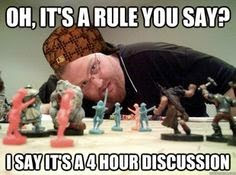
5. The Rules Lawyer: Every Game System that I have ever read or played has the following statement in some form or another: “These rules are the basis for your individual game. They are not set in stone.”
Yet you still have those who are hard and fast proponents of the “Rules as Written” Philosophy. It was this kind of thinking that led to an entire faction of 2nd Edition AD&D players INSISTING that you could only hit the Terrasque on a Critical Fail. (Typos do happen folks) And while we all enjoy debating the interpretations of rules, during the game is not the time that most players want to watch while awaiting their turn.
How to handle these Players? Simple. Explain that as the GM, you are going to go ahead and make a ruling so that the game can proceed. But that you will, at a later time, come back and let them argue their case. If you see their point, you will announce the change at the next session. If not, then your ruling will stand for all future instances.
If they refuse to let it go, then comes the not so simple part. Close your books. Put away your dice. Look at them and explain that while you are willing to discuss it, you have other players to be concerned with. If they simply must debate it right now, then you will have to end the game as it isn’t fair to have the rest of the party waiting around doing nothing.
Honestly, its at this time that most people will get the point. If they don’t, you might want to consider them finding another group that is a bit more rigid in their rule interpretation.
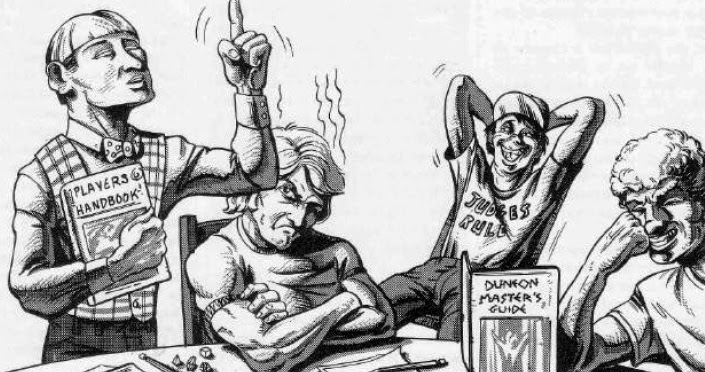
5a. The Old System Rules Lawyer: Same thing, only these Players keep interrupting to explain how it was handled in the version of the game they played, 15 years ago. By the way, that’s also the last time they actually played.
How to handle these Players: Offer to let them peruse your books, or share your (legally obtained) PDFs, so that they might familiarize themselves with the changes that have taken place since last they were a player.
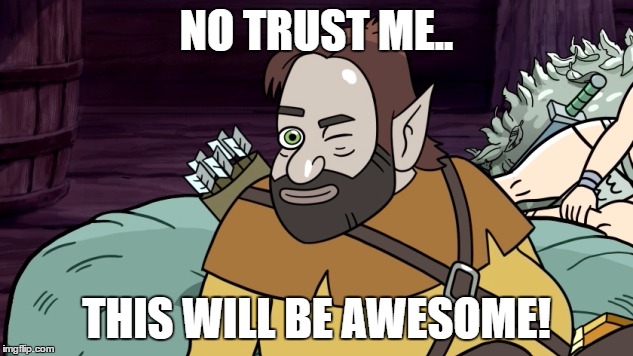
6. The Comedian: You know that friend you have that is the life of the party? The one who has a joke for every situation and is always trying to make everyone laugh? Don’t you just love that person?
Until, the moment you’re trying to build that eerie feeling for your medieval horror RPG session and they bust out with the Family Guy Reference.
They are always breaking immersion in your game because that’s what the guys on Acquisitions Incorporated do, and they wanna be just like them! They want to play the Kobold in a party of Dwarves because they think it would be hilarious. The Bullywug Jester in the party of Elvin paladin simply because they could dance around and shake their butt at the enemy instead of actual roleplay.
Awesome. If you happen to be playing that style of game. Otherwise, they’re simply making your job harder. There is a time and a place for comic relief. And, unless you’re playing a comedy game, it ISN’T every 5 minutes or so.
How to handle these players: Understand that that is simply the type of person they are. You knew this when you invited them to play. Talk with them and explain that if they really want to play this kind of character, then there has to be a compromise. They should play something that makes a little more sense thematically (or have a great backstory to explain why they aren’t) and they need to keep the jokes thematic as well.
In other words, they can make the joke, but if it requires a reference (such as the aforementioned Family Guy) that would break character, then they need think of a different joke.
If they cant respect that, or you cant handle them joking even in character, you might need to go your separate ways.

7. The Sensitive Player: There are players out there who think that they should never suffer a loss. They think that if you as the GM kill their character, you must have it in for them and secretly hate them. (never mind that you invited them to game with you in the first place) If they take more than 6 point in damage, or get attacked more than once by the same enemy, they behave as if they are being persecuted and that you’re going out of your way to kill them off.
If an item breaks or they use it all, you are supposed to provide replacement, without any cost to them of course, and they would prefer if you simply had them find it somewhere, instead of having to actually look for it.
How to handle these players: These, with the exception of the Troll above, are the hardest for me, personally.
First, with a lot of the modern systems out there, it’s extremely tough for a character to die. And, since most of my campaign settings are Epic Fantasy with High Magic, losing an item isn’t much of a problem and will usually get replaced by something else or will be found for purchase. (This, of course doesn’t extend to Artifacts or exceptionally powerful Magic items). So, when a Player says they think I’m being unfair, it kind of pushes my buttons.
That being said, I will take them to the side after the game (or before the next session), with someone else to act as a mediator. I will ask them why they feel the way they do. After letting them get it all off their chest, I will revisit those Session 0 expectations. I will explain that there are several GMs out there who believe as they do that the PCs are Special Heroes and that they shouldn’t really be at risk.
If my style of GMing stresses them out so much that they think it would ruin our friendship, I suggest that they find another group. I would rather keep them as a friend then have them in my game group.

Addendum #2 I should point out that I extend this same offer to most of these Players. I know a LOT of of Gamers from a ton of Gaming Groups and I have friends that play almost every single style out there. If you don’t fit into my group, it doesn’t mean I’m going to abandon you to your own devices. I’m going to do my best to help you find a group you fit into…
(Except for the Trolls.. I HATE those guys.)
Just kidding…Even the trolls.
Well these are the types of “Problem” Players I have run into the most and how I deal with them. I hope, as always, that you enjoyed it and found it useful. If you did, or if you know of other solutions to these issues, please feel free to comment below.
If you wanna discuss RPGs or other nerdy stuff, be sure to drop me a tweet on Twitter @DMLevianthan .
Have a great one..
DML
I thought this was a good read and covered most types of proble players. I thought your reasoned, even handed approach to dealing with each type was all good advice. I only have one other type of problem child I want to ask about, and they come with the added twist of theif lair being a public place, with strangers, and a potential for violence
The Privileged CON Player: They paid (maybe) to be at this Con, they graced you by signing up for your game and actually showing up, and now they will exhibit many (if not most) of the problem child behaviors listed above, all in one 4 hour session, because you are all strangers, they are rude or have no awareness (or a lack of care about) social queues and societal norms, and they know you don’t really want a Battle Royale with them that might turn off others from signing up for your games or worse yet, make you look bad in front of the Con administration. Their special attack is to make veiled threats of physical violence toward you.
LikeLike
Good summary, and great explanations of how to deal with each.
The worst I ever had was basically a bit of each. This was back in college when I was DMing for a large group of friends. At the time, I was a player in a close friend’s game. He ran an epic campaign but had everyone start their characters apart and some of us met up and joined forces while others didn’t. This was a low fantasy game with a lot of PC deaths.
After a while, I wanted to start my own group in the same system, and my DM was thrilled – he had never gotten to play through anything more than a one-shot, and that was pretty rare.
Of course, I took a more traditional approach and developed backstories for all the players (I believe there were 9 of them) and had them start together.
One of the players in both groups was our problem child. He always wanted to be the star of every minute of the campaign and tried to be a rules lawyer, but tended to quote rules from other systems (I think only the two of us DMing were intimate with the full rules). He went out of his way to break the immersion and the try to disrupt the rest of the party moving toward their goals.
I remember him halting me during a grand description intended to set the scene and provide a sense of urgency – all so he could attempt a ridiculous action where he wanted to tie some thread to a pair of spectacles and use this contraption as a grappling hook to retrieve armor/weapons/coins from a group of knights galloping by. He was incensed that his spectacles were trampled under the horses hooves and the thread broke.
Within a few sessions, I knew it wasn’t working but had no idea how to deal with it. I mean, this was a friend – everyone in the group were friends. I was afraid if I came down too hard on him or kicked him out that the others would get upset and walk away.
In the end, I made it a point to shine the spotlight on some of the other characters even if it meant ignoring him or asking him to wait till we got to his turn. I also told him, in open session, that the rulings I made were not going to be debated during the session as it wasn’t fair to everyone else. All these exchanges made me sweat, though.
In the end, he just stopped showing up. It took a few sessions of him promising to be there and then flaking out before I had the party leave his character behind.
The interesting thing, though, the other players shared how relieved they were that he had stopped coming. If I had realized they felt the same way I did sooner, I would have been heavier handed right at the beginning. After he was gone, the other eight players had a great time and we all enjoyed ourselves.
He did eventually try to get revenge on me in the other game (where I was a player), but that’s another story that didn’t end well for him. I did show him mercy though.
LikeLike
I’ve had a few of these over the years. I think you did just the right thing
LikeLike
Pingback: Tips To Better GMing #3: Give Your Players What They Want | dmleviathan